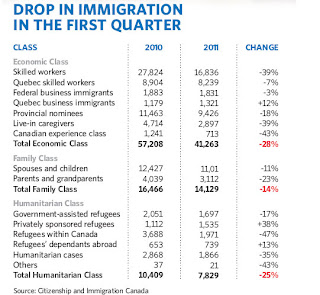Canada allowed 26% less immigrants into the country in the opening quarter of 2011 compared to the similar period in 2010. The figure of permanent resident visas issued by CIC between January and March cut down from 84,083 in 2010 to 63,224 this year, in keeping with figures obtained by the Star.
The most recent department numbers show a turn down across the board, with visas for skilled workers losing 28 per cent, family-sponsored relatives downward 14 per cent, and refugees dipping by 25 per cent. The noteworthy drop in visas comes on the eve of public consultations Immigration Minister Jason Kenney is holding on the country’s immigration altitude and classes of populace that are supposed to be allowed in.
In the month’s primary up to the May 2 federal election, the Conservatives touted 2010 as a sign year in immigration; receive 280,000 permanent residents, the maximum in 50 years. In 2009, just about 265,000 immigrants were granted permanent status.
Mention this year’s quarterly figures, immigration officials say it is unjust to use the 2010 figures as a standard since it was a record year in granting permanent visas. On the other hand, department is convinced that regardless of lower visas/authorizations issuance and admissions in the initial quarter, it will meet its yearly target of visas,
Over the previous 15 years, Canada’s yearly immigration levels have remained around 250,000, about 0.8 per cent of the residents.
Immigration lawyers say less permanent visas could mean larger backlogs, particularly for family sponsorships where there is no limit on applications like there is for skilled workers and investors. Immigration lawyer Mario Bellissimo said he would not be surprised if the minister brings in a latest law to limit family sponsorship applications. Since 2006, the figure of visas for sponsored relatives and refugees has turn down, at the same time as visas for workers have progressively increased.
Since 2008, the federal government has made many changes to its immigration program in an effort to get rid of backlogs and route applications in a more opportune fashion. It counts on capping the figure of immigration applications it accepts for processing.
A section backgrounder for the future consultations, which are by invite only, suggests at the same time as increasing immigration may be one way to resolve the growing demand, “there are obviously a number of pressures that make trade-offs predictable.”
With an elderly population immigration levels will require to be raised to 350,000 yearly to support Canada’s financial growth.


0 comments:
Post a Comment